Breaking bread
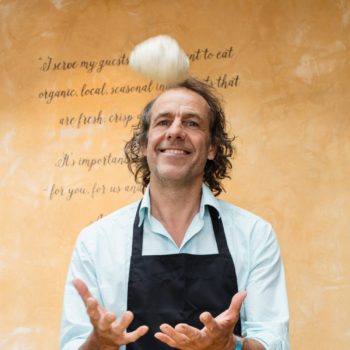
Jetting into Dublin to host a baking masterclass, Alain Coumont, the founder of organic bakery Le Pain Quotidien, says baking was “a hobby, but I didn’t want it to be an expensive one”. Au contraire, since founding the chain nearly 26 years ago, it has turned out to be an astute business move, as Gillian Hamill finds out
28 July 2016
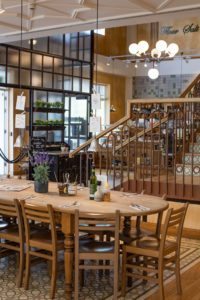
The communal table is an important focus in Le Pain Quotidien outlets
It’s often said that necessity is the mother of invention. This was certainly the case for Belgian chef and founder of Le Pain Quotidien, Alain Coumont. Unable to find the right kind of bread to serve in his restaurant, nearly 26 years ago, Coumont decided to make his own. As the three-tonne oven he bought had the capacity to produce 120 kilos of bread, the enterprising chef decided to sell the excess in a cosy 36 sq m store in Brussels. Since then, his organic bakery has blossomed into a global community with over 200 restaurants spanning 17 countries across five continents. The chain’s first store in Ireland opened at the upmarket Kildare Village in October last year, and has performed well, with plans afoot to open more stores in Dublin. A move which the capital’s foodie clientele are no doubt salivating at the thought of!
Central role of communal table
Naturally, bread is the star of the show at Le Pain Quotidien, which literally translates as ‘The Daily Bread’. However without another popular aspect of the store, Coumont says, “I don’t think I’d be here today”. The communal table is a central aspect of the group’s appeal in his view. However this development, which today is a signature feature of many Le Pain Quotidien outlets, actually came about quite by accident. Following the logic that “old fashioned bread means old fashioned settings”, Coumont picked up a seamstress’ table for a song at a flea market, which he declares had the twin benefits of being both “cheap and cute”. An architect friend who helped him design the store derided the idea of having just one table as “crazy – people won’t sit at the same table to the priest, the banker, the old lady, they are not going to sit together”. However Coumont was not to be deterred and promptly decided, “let’s go for it!” A decision he has not regretted since.
Indeed, having the right atmosphere in-store through features such as the famed communal table is extremely important for Coumont, and that is why the team are taking the time to ensure they find exactly the right locations for the brand in Dublin. “We were thinking about it for a long time,” he says. “Maybe for the wrong reason, because the rents in London are depressing – for the tenants, not for the landlords.”
Location, location, location
Coumont explains that the brand signed a deal with Value Retail – which specialises in the creation and operation of luxury outlet shopping destinations – for two projects. Namely, Bicester Village outside London and Kildare Village. The chef says of his decision to sign on the dotted line: “It was a good opportunity to discover Ireland and now we are very happy to be here. We are actively searching for one or two more locations in Dublin, so we are going to [have done that] by the end of the year.” He is determined not to rush the process however. “I’m sure we will find a new spot,” Coumont says, “but it’s not like an obsession thing, ‘I have to be open here in six months’, it’s really about finding the right building. It’s a lifestyle thing; finding the right building with the right tenants. I don’t want to be stuck between a pharmacy and a Tesco, I want something more relaxed; more of a slow pace.”

Chef Alain Coumount was recently in Ireland to host a baking masterclass at Le Pain Quotidien in Kildare Village
‘A church for the ego’
While Coumont appreciates the importance of “a slow pace” within café culture, it’s unlikely that a slow pace was something he found much of, working in the kitchens of top chefs’ restaurants in France. These include Michel Guerard (one of the founders of nouvelle cuisine and the inventor of cuisine minceur), George Blanc (three Michelin stars) and Joel Robuchon (voted Chef of the Century). ShelfLife was keen to hear if working in such well-regarded kitchens could be likened to the Gordon Ramsey-style, high pressure scenarios we see on our TV screens. ”There is pressure I think, but it all depends, there [could be] a restaurant where it is very relaxed,” says Coumont. “I would say that if you go into the high end of the restaurant industry, at every table you could kill your reputation because it could be a food critic or a friend of the Queen or something, so the pressure, usually in those big restaurants, it is a church for the ego of the chef so this is very precious, and very fragile.” That said, in Le Pain Quotidien he tries to keep things as simple as possible. “I think in Le Pain Quotidien it is easy, because we try to make good bread, good butter, with organic ham if we can find it and basically, it’s anti-creativity.”
Irish partnerships
When simplicity is to the fore of any menu, good ingredients are essential. This is something that the boulangerie brand knows only too well and has therefore struck up a number of partnerships with organic and locally sourced foods here in Ireland, including Keelings, Gubeen, Flahavans Organic Porridge, Tartine Organic Porridge and Featherbed Farm Ice Cream. Commenting on the importance of these partnerships, Coumont says: “We are very committed to organic and I think that local makes sense because it’s fresher and it’s less expensive to get something shipped from you don’t know where. When you have good bread, you have to put something on top of it which is going to enhance the quality of the bread. You cannot put processed cheese on a great piece of soda bread, it would not make sense.”
Speaking of good breads and the latest trends within the bakery category, Coumont talks about wheat with an obvious enthusiasm. While today, there is a growing demand for gluten-free produce, the chef declares: “Gluten is becoming a liability and in fact, it’s not the bread, or the wheat or the gluten itself, it’s about I would call the modern wheat.” Ancient, ‘angel’ wheat is what Coumont would like to see a return to, but this would require a number of difficulties to be overcome. While the topic is a complex subject, Coumont describes it thus: “Even for people who are not coeliac, the mainly American [modern] wheat, they are so strong in gluten that basically when you eat it, even in your stomach, you don’t break down the gluten.” In fact, he describes the scenario in almost horror movie terms, “like bed bugs scratching” your intestine. He also points out that those with coeliac disease do not actually have an allergic reaction to gluten, but the gliadin within gluten. At Le Pain Quotidien, he says, “most of our bread is made with sour dough to make it more digestible, also the wheat we have now, they are not super strong but they are still not the very ancient ones.”
A return to ancient wheat
Unfortunately, the problem with ancient ‘angel’ wheat now is that “they are not grown anymore. There is farmers putting them back into the field but the problem now is that those wheats, they are not EU-certified anymore so in fact, technically, to sell the seeds is illegal because they are not in the European catalogue. [Subsequently] now in France, there are a couple of guys who are growing those wheats, and they mill the flour and they bake the bread and sell it in their farm.”
The good news is that “in the US, there is no legislation about seeds, you can grow everything you want,” says Coumont. That said, ‘angel’ wheat is much more expensive to grow. “As soon as you stay with the ancient wheats, they are super high, sometimes two metres high and if you use fertiliser to make them grow more, they fall because they are too high. Now the problem with [modern] wheats is, the wheat is lower so it catches diseases and the [growers] have to use pesticides.”
In fact, Coumont says ancient wheat “costs at least ten times more than the regular wheat and some people say ‘wheat costs nothing’. The problem now is that we want to eat super cheap,” he adds, pointing out the potential pitfalls of this logic. “You know if you buy a pair of shoes that’s 20 bucks, you know they’re going to last maybe for one party, for the evening, but if you pay $200, you throw them out because they are out of style.”
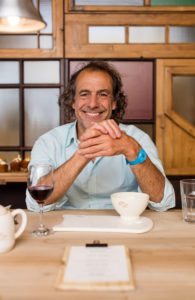
Alain Coumont believes it is good to have a “more relaxed” feel to his bakeries
Organic growth
This belief about the importance of maintaining quality has clearly fuelled Coumont’s determination to source the best possible food. “I would say the organic movement is a great thing but to me, organic is not even enough now, you have to go way deeper into the thing and also it’s about, the fact that you have to make a good product. You can have organic beef that has not enough fat, not enough age and it can be tough and organic. For a burger, it’s fine but if you want to eat a nice, thick cut [steak], if it is grass-fed it is better, and if you age it for three weeks, the whole carcass together, [it is better]. I would say the compromise is in between health and environment and also the pleasure of eating. Eating is also a social act because usually you are together except when you eat your Big Mac behind the wheel of your car in between two lights.” And here, we come to the nub of the matter. Coumont clearly believes it is better to spend a little more on the little pleasures of life like eating in good company: an ethos which goes a long way in explaining Le Pain Quotidien’s success to date.



 Print
Print
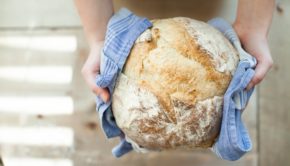
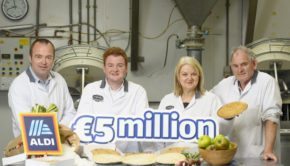

Fans 0
Followers